Hello and welcome to the Episode 6 of the What China Wants podcast.
In last week’s episode we discussed the potential for a Great Split between China and the West over Taiwan. Today we examine the different ways that Beijing might force reunification with what it terms a renegade province, and what the global economic repercussions would be from such a move: it’s not a spoiler to say that they would be horrific.
You can also listen to the podcast on Apple, Amazon, or Spotify.
As always please do share, comment, and subscribe. We’ll be back next week.
Many thanks for listening.
***
Here is the episode transcript:
Stewart Paterson: "If the US and the West impose destructive sanctions on China, like those sanctions against Russia, we must recover Taiwan [...] we must seize TSMC." That was Chen Wenling, the chief economist at the China Centre for International Economic Exchanges.
For those of our audience who don't know, TSMC is the Taiwanese Semiconductor Manufacturing Corporation, and it's the largest foundry operator in the world, and that's a manufacturer of semiconductors. Sam, welcome, hello.
Sam Olsen: Hello Stewart. That was quite a worrying quote you started us off with.
SP: Indeed. Just before we get on to talking about the economic and political ramifications of a Chinese invasion of Taiwan, and the ensuing 'Great Split' between China and much of the rest of the world, I'm sure some of our audience are wondering, particularly in the light of Russia's making a bit of a meal out of its invasion of Ukraine, what sort of form would a Chinese invasion of Taiwan take, in your view? What are their options?
SO: First of all, it's important to note that China is not actually sitting there saying, "we are going to invade in the next few months". They have however said, as we've said a few times in the podcasts already, that they are likely to start planning for reunification of Taiwan, whether peaceful means or not, before 2027, which means that they're certainly looking to do something in the near future. I don't know if any of our audience heard it, but last week there was a leaked audio file from the Guangdong Military Command, talking about how they would be involved in an invasion of Taiwan.
Certainly, even though there isn't any official announcement on this preparation, from the outside China certainly looks like a country that is preparing for war. Politically, it is preparing its population, talking about Taiwan as being an immutable part of the mainland. In fact just a few days ago, at the Shanghai Dialogue in Singapore, the Defence Minister said that anyone that tried to get in the way of China and Taiwan's reunification would feel the full force of the People's Liberation Army.
And militarily, they're certainly looking to get things in the PLA and the PLA Navy up and running to be a match for the Americans, or so they hope.
So, in terms of how that will go, there are three scenarios that I think people look at. Now obviously the third one is an invasion, whether that be an air assault, or a full-on naval invasion. But the first one, before we get there could be a salami slicing of territory.
SP: Yes, well hold on, we might need to just explain that because people tend to think of Taiwan as being one island. But actually, the Republic of China, which we call Taiwan, is made up of an archipelago isn't it? There's one big island, but then there are some small islands that the Republic of China, i.e. Taiwan - not the People's Republic - the Republic control. And those are very small, but some of them are literally a stone's throw from the People's Republic, aren't they?
SO: Exactly. Now, did you know that there is actually an island controlled by Taiwan called Taiping Island in the middle of the Spratlys? And there are approximately four people defending it with no weapons and a large runway. So that's something that could go very easily. There are also some islands, just off the coast of China; in fact that I've sat in Xiamen having afternoon tea, looking at an island belonging to Taiwan, a mere stone's throw away from the coast. So it's very possible for China to go and grab some of those.
I suppose the next question will be why would they want to do that? It'd be a show of force, of course. But what would spark that show of force? Well in 2024 we will have the new elections for president in Taiwan. President Tsai, the current president, is time-barred, so there'll be a new generation coming through. And there is a great fear amongst people we know in Taiwan, that there's the so-called Zelensky-isation of Taiwanese politics where these youngsters don't want the status quo anymore. They want to stick it to China, the big country (like Zelensky stuck it to Russia), and say "Look, the status quo is not working for us anymore. We're sick and tired of being bullied by China, we want to go down the independence route."
And if they did that, then it's highly likely that China would do something meaningful in return, for example, by salami slicing and grabbing some of the islands like Taiping or the Pratas islands or whatever. And at that point, Taiwan would have to make a decision - are we going to fight back, are we going to use our submarines to try to sink some Chinese ships? And if that happened, what are the Americans going to do, etc? This is the least-worst case scenario.
The second scenario is far worse, and that brings in your side, the economic side. Can you guess what the second scenario is, Stewart?
SP: No, go on, you'll have to tell me. I don't know much about military strategy Sam.
SO: It would be a blockade of the island. Okay, so I'm pretty sure that you that's got your economic alarm bells dinging because in January last year, in 2021, China brought in a new law, which in effect allows its coastguard, to use all necessary means to stop and search non-Chinese vessels in any waters that it claims for itself - which, in other words, is the Taiwan Strait and the South China Sea.
So you can easily imagine a situation where the 300 or so ships from the Chinese navy, plus all its coastguard, and its militia, its grey-zone boats that are meant to be fishing boats, but they're not, blockading the island. And anyone that turned out with food, let them in, because China doesn't want to be seen as a humanitarian ogre. But anyone with arms or shipments or anything like that designed to help Taiwan shore up its defences, well just take them and take the ship and move it to Xiamen or Shanghai.
SP: So that's interesting, Sam, because I think even just today, I was reading that the American administration have come out and publicly said that at multiple levels, the Chinese have been telling them that the Taiwan Strait is not international waters, it is a part of China's exclusive economic zone. And therefore, there is no right to freedom of navigation through the time Taiwanese Strait. That's quite alarming, isn't it?
SO: It is, and that plays entirely into the hands of the China lawmakers that made that law. In other words, whatever they declare to be Chinese waters is their waters, and they basically can blockade it. A blockade might stops arms going to Taiwan and so allowing the island to increase its military capabilities, but also it stops economic stuff coming in from the rest of the world. This also means China might want to then stop shipments of Taiwanese semiconductors going anywhere except for China. There are so many economic ramifications from a blockade that I don't even know where to start.
The third scenario, after salami slicing and blockades, is even more dangerous for the world. It is a hot war where China just sends in either an air assault to capture Taipei very quickly, or a huge flotilla of ships. If they've already got a blockade, it's going to be so much harder for the Americans or the Japanese to do anything, because the Allies won't be able to land personnel, and they won't be able to do much to reinforce the Taiwanese military full stop. So once the blockade goes in, I think that then we know that the end game is nearing. And I think that's probably where the economic side really kicks in, wouldn't you agree?
SP: Well, if Taiwan were blockaded, or the Mainland were able to determine what came in and what came out, then if they wanted to cause a lot of disruption to the rest of the world they certainly could.
I think it's quite interesting to note, we often use Xi Jinping quotes. Usually, when they pertain to economics it's about self-sufficiency, resilience, and national power. I will give you a quote from Michael Boskin, from 1992. And he, for those of us who need reminding, was the chairman of the Council of Economic Advisers at the White House, so the presidential advisor on the economy. He famously quipped, "potato chips, computer chips, what's the difference?" In other words, what he was saying was that there was no need for the United States to have an industrial policy whatsoever. American companies would make what they were good at making and America would buy from the rest of the world what needed to be bought from the rest of the world.
Then we contrast that with China's mercantilist approach to industrial policy, where in fact in China, the government is spending more now on industrial subsidies than it does on defence. In other words, China is putting a lot of money into ensuring that it is as self-sufficient as can be in the key ingredients into its economy. And obviously, semiconductors are one area where they've come up short.
It's worth noting here that semiconductors are not fungible things, you're comparing apples and pears here. But Taiwan accounts for almost two thirds of foundry-made semiconductors by value in the world. And its total semiconductor revenue accounts for about a quarter of the world's revenue. Now the big difference there is that of course a lot of semiconductor revenue goes to people who designs semiconductors and hold the patents on them, but they don't actually make them. And TSMC is by far and away the leading semiconductor manufacturer of low geometry production. So in other words, the most efficient and cutting edge of the foundry-made semiconductors. The idea that the People's Republic of China would be able to control what came in and what went out of Taiwan would leave basically the rest of the world semiconductor industry, or electronics industry rather hostage to the whims of the PRC.
SO: Okay, so what happens? Let's just talk about the worst-case scenario, and that there is an embargo, and they tend to allow chips to go out anywhere except for China. What happens to the rest of the world? What happens to the UK, what happens to the US and their economies? Do they just grind to a halt?
SP: Well, there would be chronic shortages of everything that involves semiconductors, and obviously a lot involves semiconductors. And so the prices of semiconductors - they've been strong anyway but I'd imagine they would go through the roof. And what we are seeing in all Western countries really is a very belated effort to push back against Michael Boskin's ethos of potato chips and computer chips being fungible by an attempt to create an entire ecosystem in the manufacturing, design, production, etc, of semiconductors that is not dependent on the People's Republic, or the Republic of China, Taiwan. But this takes time, and semiconductor manufacturing tends to evolve in generations, as you move through geometries. And inevitably, the companies that were leading-edge in the previous generation tend to have the cash flows to invest and be leading-edge in the next generation. And that is a model that TSMC have been particularly good at perpetuating.
It would be devastating for the global economy, in my view, if Taiwanese semiconductors were cut off from the rest of the world. What we would be compelled to do would be effectively to turn a blind eye to everything that was China was doing, because we would be then forced to effectively import from China or import products from China. And obviously, one would imagine that they would make the sale of those products conditional on us accepting the fait accompli on the future of Taiwan.
SO: I saw a report which said that America would take five years or so plus $30 billion to get to the stage where Taiwanese semiconductor industry is right now. That's an awful lot of money, and also has no guarantee of success. The Europeans are trying to build up their own industry, but again, lots of people are saying that that's not going to happen. At the end of the day, I think you're right, how could there be any other option but to rely on Chinese exports of semiconductors if they control the island?
But if they did invade Taiwan, then it wouldn't just be about the semiconductor industry? Surely there'd be other economic issues stemming from that? What about all the sanctions and the counter-sanctions laws that China's got now? Surely there would be some kind of push-back by the West in the form of economic sanctions, since we don't really want to fight them directly? And then the counter-sanctions law come in, and then what happens then? Do all our assets and all Western assets in China get frozen, or stolen, or appropriated whatever word you want to use? What's the scenario there?
SP: Yes, well, I mean, it's very hard to say, isn't it, how far this economic warfare would go? Because if it was a fait accompli, that China had control over a large part of the global semiconductor industry, we would find ourselves as a free world trying to push back against China in a similar kind of position to the one that Germany has found itself in through its dependency on Russian gas, where they're saying, well, we'd love to have an embargo on the gas, but not yet because we can't afford it. And your five-year timeframe for America to ramp up the right amount of volume in semiconductor manufacturing to offset the losses from Taiwan is interesting, because it puts a kind of window doesn't it, in which China will perhaps feel that it can operate without Western repercussions?
But I think the points I would make with regards to China's importance to the global economy is that China now commands close to 30% of global manufacturing, across a large range of industries. It's not just toys anymore. It's capital goods, electronic machinery, electrical machinery, where they have a high degree of dominance.
Their core vulnerabilities are obviously in hydrocarbons and to some extent, food. And obviously when one looks around the world at the big food exporters, they tend to be fairly closely Western-aligned. The United States itself is a huge net exporter of food. Canada, Australia, are big exporters, Brazil is more non-aligned, perhaps more neutral in this. But then, of course, we must remember that the European Union has spent the best part of 40 years trying to encourage its farmers not to produce food through the Common Agricultural Policy, and therefore there is a huge amount of latent capacity in the European economy to ramp up food production, one would hope. So, from the food side, I would argue that the aligned Western powers actually hold the upper hand in that regard. But the kind of economic dislocation that would be associated with…
SO: Sorry to interrupt you there, but you were just talking about food security. Well, surely one of the benefits of the 'Great Schism' between Russia and the West is the fact that Russia is now in China's court, and China has access to all Russia's food. So that makes them less vulnerable, surely moving forward?
SP: Oh, yes, it's a good point. And of course, particularly, if when you talk about Russia, if one were to assume that part of Ukraine was subsumed into Russia, or that Ukraine's ability to export out of Ukraine was limited, because the Russians were occupying or controlling the Black Sea or the Sea of Azov and making it hard to get wheat and grains out, so that would be true. But China still has these dependencies on food, so it doesn't get them off the hook there.
SO: Okay. So what about Western assets being seized in China, as some people were saying that that's what the counter-sanctions laws lead to? But what about the other way around? If there was this 'Great Split', what action will be taken against Chinese companies working in the West? Do you think that we would do tit-for-tat and basically stop them working in the UK and Australia, etc? Or do you think that because of the threat that China has over semiconductor supply, and other parts of the world economy, that actually it's more likely we'll just leave everyone alone, and it'd be a lot of hot air like there has been with Russia?
SP: Yes, I mean, it's a great point. I think that Russia probably provides the model, in terms of the way the West would want to pursue things. And of course, it doesn't have to be assets being sequestrated; they can be frozen until such time as the economic warfare ceases, which presupposes that ultimately, the West would triumph in such an eventuality. And I think we would, because when you look at the balance of economic power, as successful as China has been, the economic dimension to its national power is not as great as one might imagine. When you know what you're doing and measuring the economic power and the resilience of a country to withstand a sustained economic shock, per capita GDP in China is only about $10,000 in nominal terms, and so there are a lot of people who are still very close to the breadline, as it were. So the speed with which unrest, disillusionment with the state of affairs could spread in China, I think, should not be underestimated.
What we're sort of concluding on the economic side is that it pivots around a few things. When the need arises, how far down the road are we of replicating Taiwan’s semiconductor supply, which depends on the timing of this event, how quickly we pursue that. And clearly, I would argue that one of the policy ramifications of this discussion is that the West needs to pursue self-sufficiency in semiconductors as a point of urgency or it will find itself in emasculated when it comes to pushing back against any Chinese attempt to militarily take Taiwan or to blockade Taiwan.
And so, I think that's really the hinge point; that will depend on whether it's China or the US that has the ability to prevail in the economic dimension. But Sam, what about the political dimension? Surely one of the ramifications of the Great Split would be that a lot of the multilateral organisations that we're used to overseeing the global commons and sort of establishing global norms will become dysfunctional if we're in this standoff between China and the United States and the other permanent members of the Security Council?
SO: Yes, you raise a very good point. And just before I answer that, I think it's important to note that the five years you mentioned about the hinge point on whether China or America has the upper hand when it comes to semiconductors, which is such a crucial part of the economy - that five years between now and 2027 is also the period of the National People's Congress time limit as well. So the next time that Xi Jinping will be bringing everyone together, in 2027, he wants Taiwan's question to have been resolved. I think that we have two very good reasons why the 2027 timeframe is very much the one that people should be thinking about.
But in terms of where we go after - the political fallout - it could be incredible. If people remember their history, the League of Nations fell apart when you had the Italian bloody adventure in Ethiopia, and also Japan as well and the failure to agree about rearmament. And it was an awful time in the 30s, when the countries did start to pull apart from the multilateral organisation that had been put together at the end of the First World War. And I think that such a move on Taiwan would really put those pressures back into the international environment. First of all, the United Nations Security Council would be completely broken. You'd have China and Russia on one side, Britain, America, and hopefully France on the other, and, everyone else will fill in-between. Therefore you would have the most important global body paralysed, and China's been putting an awful lot of effort into winning the hearts and wallets of the United Nations over the last decade or so, getting its people put into the top positions in lots of different bodies. And that means that China is a much better operator at the UN level.
And if we have in 2024, an isolationist - a unilateralist - back into the White House, whether it's Trump or someone else on that side of politics, it's very easy to say, "Okay, well, the United Nations is not working for us, America is not going to be part of it anymore, because we think it's just a tool for China." And at that point, you do start to see the great fissures across the world re-emerging. But it's not only that people keep saying that, if Russia wins in Ukraine, it will be emboldened to capture back other former Soviet Union Territories - Moldova, Baltic states, perhaps parts of Central Asia. But if China wins in Taiwan, it may feel that it's able to offer a better source of legitimacy for the CCPs rule by winning back territories. Remember that the Qing Empire was far bigger than China today, by a quarter or a third, if I remember rightly. And there are at least 10 different territorial disputes that China has around his borders.
So I think that if China won and Taiwan and basically got rid of American power from that part of the world, it would signal the end of American hegemony in Asia simply because all of its security guarantees will be null and void if it's unable to keep Taiwan out of China's reach, especially after Biden, in recent months has jettisoned at least verbally the position of strategic ambiguity. At the end of the day, Taiwan will play a massively important role in determining who leads at least Asia if not the world, America or China. And that's not good for politics, let alone economics.
SP: So the conclusion we seem to be drawing here is that if the West doesn't get its act together, and put itself in a position where it can act freely, free from fear of being sanctioned, and being cut off from Taiwan's semiconductor supplies, then we will basically be impotent in the face of a Chinese invasion of Taiwan. That in itself, will probably lead to Chinese hegemony over Southeast Asia, and indeed, the Asia Pacific, and probably the multilateral order.
SO: And economically dominant because they will control the technology supply chain until the West can get its own act in order. And I think that's a really important thing that companies and governments need to do. And at the risk of not sounding too alarmist. One of the things that you and I do at Evenstar is to help companies prepare, using wargaming analysis, how they would react to some of the economic scenarios you've so eloquently set out. But I think that if we don't start preparing now, within these next five years, then I think that a lot of difficulties will be faced by the West, but by China as well.
SP: Indeed. Thank you very much, Sam.
SO: Well, we'll be back next week for more What China Wants topics. We haven't actually decided what we're going to talk about next week, but I'm sure we will find something in the next few days. But thanks for your upbeat assessment of the economic future Stewart.
SP: And thank you, Sam.






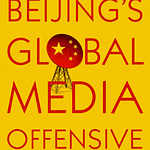
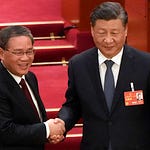
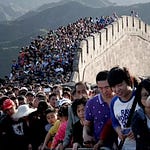
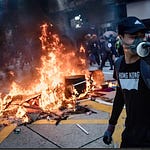
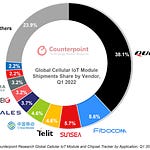

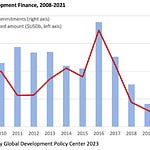
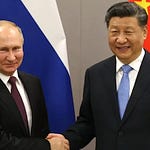
Episode 6: The Coming Economic Shock of the Great Split